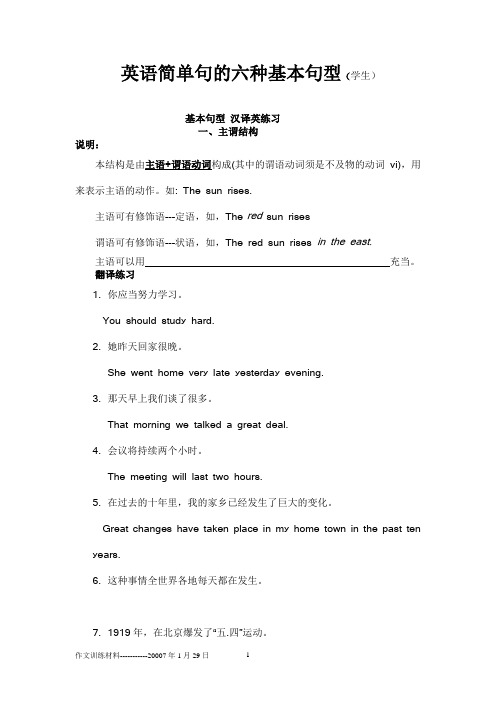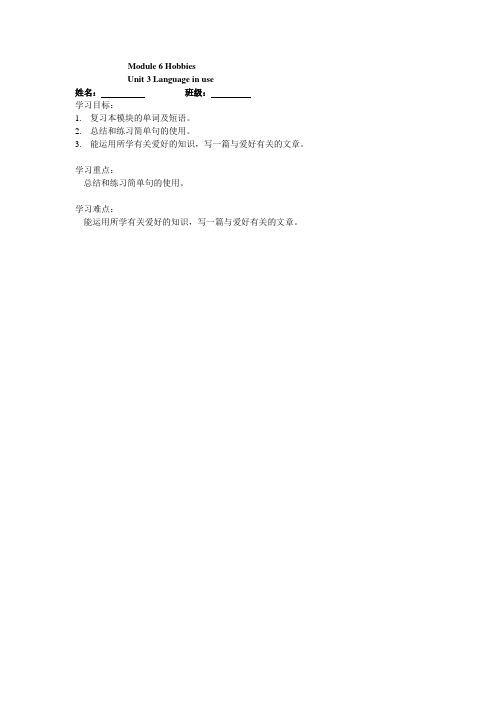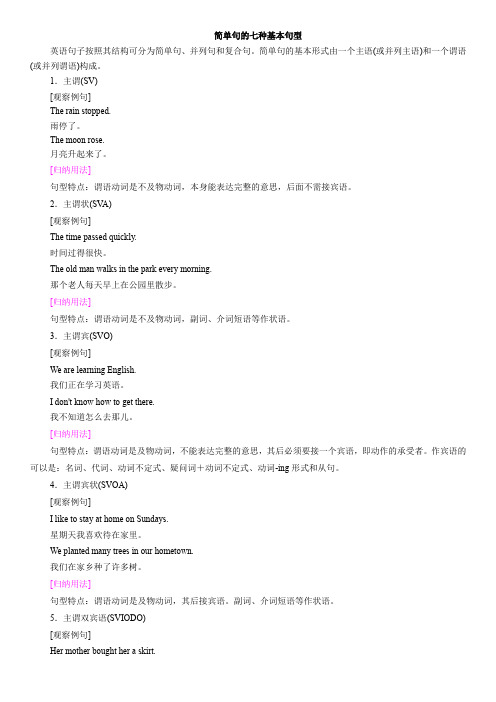简单句的六个基本句型
简单句的六个基本句型

简单句的六个基本句型句子是语言运用的基本单位。
能正确写句是最基本、最基础的写作微技术。
英语句子变化多端,但都能够由简单句归并或扩展而来,所以掌握简单句的六个基础句型是写好英语句子的第一步。
简单句能够插入定语和状语扩展成为复杂的长句,能够经过增添关系词变为并列复合句或主从复合句。
⑴ 主语+系动词+表语⑵主语 +谓语 ( vi. )⑶主语 +谓语 ( vt. ) + 宾语⑷主语 +谓语 ( vt. ) + 间接宾语 +直接宾语⑸主语 +谓语 ( vt. )+ 宾语 +宾语补足语⑹ there be 句型句型 (1): 主语 +系动词 +表语此中“系动词+表语”一同组成谓语。
常有系动词:①表示“是”的:_______________________________________________________________________________ ②表示“ 起来”的:_____ ( 尝起来 ) , ______( 看起来 ) , ______ ( 听起来 ) , ______( 摸起来;感觉) , _____( 闻起来 )③表示“变为”的:_______________________________________________________________________________ ④表示“保持”的:_______________________________________________________________________________ ⑤表示“仿佛、仿佛”和“证明”的:_______________________________________________________________________________ 注:既无被动语态,也无进行时态。
表语是接在系动词以后的说明主语是什么或处于某种状态、拥有某种特征的成分。
能作表语的主假如名词、代词、形容词、少量副词、介词短语、非谓语动词和表语从句。
简单句句子结构

简单句的基本句型简单句是英语中的基本句子,了解和掌握这五种基本句型对学好英语极为重要。
这六种基本句型是:1.主语+谓语结构:常用来表示主语的动作。
常与表示时间、距离、重量、价值等的副词修饰语连用。
如:They worked day and night. 他们夜以继日地工作。
2.主语+系动词+表语(主系表结构)本结构是由"主语+系动词+表语"组成,主要用以说明主语的特征、类属、状态、身份等。
此句型中常见的系动词:be, become, come, get, smell, taste, feel, sound, remain, stay, appear, go, turn, fall, keep等。
(1)主语+系动词+形容词(作表语)如:It feels good to be home.在家的感觉真好。
(2)主语+系动词+名词(作表语)如:He is a student. 他是个学生。
(3)主语+系动词+副词、介词短语或反身代词(作表语)如:He is near. 他在附近。
3. 主语+谓语+宾语(主谓宾结构)此结构其中的谓语动词须是及物动词(短语),宾语须是名词或相当于名词的成分。
(1)主语+及物动词+名词或代词(作宾语)如:May I use your computer ? 我能用一下你的电脑吗?(2)主语+及物动词+动名词(作宾语)。
此类及物动词(短语)有:advise, consider, avoid, mind, miss, suggest, finish, practice, imagine, enjoy, delay, escape, feel like, put off, give up,等。
如:You shouldn’t giv e up studying. 你不该放弃学习。
(3)主语+及物动词+不定式(作宾语)。
此类及物动词有:afford, agree, ask, expect, hope, want, wish, manage, pretend, decide, determine, learn, offer, plan, refuse等。
语法基础

1.简单的简单句: 简单句的最基本6个句型 ①SV(主谓) ②SVO(主谓宾) ③SVP(主系表) ④SVOOC(主谓宾宾补) ⑤SVIODO(主谓双宾语) ⑥There be + O(There be 句型)
2、复杂的简单句: 在六大句型基础上加三大修饰成分(定语、状语、同 位语)后句子变得更加复杂了,但仍属于简单句(即句号 前只有一个主谓结构)。 例句:I left the beautiful city Beijing yesterday. 主 谓 定 宾 同位 状
So/neither/nor +谓语/助动词+主语 He is a diligent student, So is he He likes swimming, so does she.
So/neither/Nor +主语/谓语/助动词/情态动词 He is a diligent student, so he is .
主语小结
1it作形式主语,真正的主语是后面的不定式, 动名词或句子 2that引导主语从句位于句首,that 不可省略
引导词 从句中的成分
That(一定不能省略)whether if
When, where, why , how Who, whom, what Which, whose
不作成分
作状语 作主语,宾语或表语 作定语
(1996年考研英语阅读理解passage 3) 这种改变通过引入大量专业元素,满足了新时代的技术要 求,也阻止了效率的下降;这种效率的下降,往往在精力 充沛的创建者之后的第二代和第三代时让家族企业倒闭。
主语
可充当主语的成分: • 名词 代词 数词 • 名词化的形容词 分词 • 动词不定式 • 动名词 • 句子(主语从句)
简单句的基本句型

简单句的基本句型
简单句是语言表达中最基本的句型,它由主语和谓语构成,表达一个完整的意思。
在英语中,简单句的基本结构为主语+谓语,而在汉语中,简单句的基本结构为主语+谓语+宾语。
下面是一些常见的简单句基本句型:
1. 主语+谓语:他跑了。
2. 主语+谓语+宾语:我喜欢你。
3. 主语+谓语+宾语+宾语补足语:他把书读完了。
4. 主语+谓语+宾语+宾语补足语+定语:他把那本书读完了。
5. 主语+谓语+宾语+宾语补足语+状语:他把那本书读完了,然后去睡觉了。
6. 主语+谓语+宾语+宾语补足语+状语+定语:他把那本书读完了,然后去睡觉了,睡觉的房间很安静。
7. 主语+谓语+宾语+宾语补足语+状语+定语+补语:他把那本书读完了,然后去睡觉了,睡觉的房间很安静,他感到很满足。
8. 主语+谓语+宾语+宾语补足语+状语+定语+补语+并列句:他把那本书读完了,然后去睡觉了,睡觉的房间很安静,他感到很满足,但他还有很多事情要做。
9. 主语+谓语+宾语+宾语补足语+状语+定语+补语+并列句+条件句:他把那本书读完了,然后去睡觉了,睡觉的房间很安静,他感到很满足,但他还有很多事情要做,如果他不努力,就会失败。
10. 主语+谓语+宾语+宾语补足语+状语+定语+补语+并列句+条件句
+时间状语:他把那本书读完了,然后去睡觉了,睡觉的房间很安静,他感到很满足,但他还有很多事情要做,如果他不努力,就会失败,明天他要早起去上班。
简单句的五种基本句型

简单句的五种基本句型1、主语+谓语(不及物动词)2、主语+谓语(及物动词)+宾语3、主语+系动词+表语4、主语+谓语+间宾(表示人)+直宾(表示物)5、主语+谓语+宾语+宾语补足语▲主语、动词(不及物动词、及物动词、系动词)、宾语及宾语补足语可以称为基本句子成分。
完整的句子一般至少包含2个基本成分,至多4个基本成分。
主语:名词、代词、The + adj、V-ing、动词不定式、从句宾语:名词、代词、The + adj、V-ing、动词不定式、从句宾补:名词、形容词、副词、V-ing、V-ed、从句等联系动词:be / feel/ taste / smell / look(感官动词)/appear /seem/(好像)become /get / grow / turn/go (变化)remain/ keep/stay(保持)等表语:名词、代词、形容词、副词、V-ing、V-ed、动词不定式、从句等主语+谓语(不及物动词)总结:这种句型常与副词、介词短语、不定式、分词等状语一起连用主语+谓语(及物动词)+宾语总结:作宾语的可以是名词、代词、不定式、-ing分词、-ed分词等接不定式作宾语的常见动词有:attempt, dare, decide, desire, expect, hope, intend, learn, need, offer, pretend, promise, refuse, want, wish接-ing分词作宾语的常见动词有:admit, advice, avoid, consider, defend, enjoy, finish, forbid, mind, miss, practise, risk, suggest, give up, can’t help主语+谓语+间宾(表示人)+直宾(表示物)总结:to:give, hand, leave, lend, offer, pass, sell, send, show, teach, tellfor:buy, choose. get, leave, make, save, sing主语+谓语+宾语+宾语补足语总结:作宾语补足语的有名词、形容词、介词短语、不定式、-ing分词、-ed分词等Eg:allow, advise, ask, beg, cause, choose, encourage, force, expect, get, hate, invite, order, warn, teach, tell, want + sb. to do sth.Eg:feel, have, hear, let, make, notice, watch, see + sb. do sth.。
仁爱英语八下U5T3语法 简单句的基本句型

U5T3 语法精讲(八下)简单句的六大基本句型初中阶段我们需要重点掌握简单句的六种基本句型及其主要用法。
一、S + V(主语+不及物动词)此句型的句子有一个共同特点,即句子的谓语动词都能表达完整的意思。
这类动词叫做不及物动词,后面可以跟副词、介词短语、状语从句等。
SV(不及物动词)1. Time2. Class3. The man4. We all5. Everbody6. I7. The sun flies.begins!. doesn’t smoke. laughed.has arrived.am crying. rises.【练习导航】Ⅰ. 根据汉语完成下列英语句子,每空一词。
1. 他在听。
He _____ _____.2. 昨晚你睡得好吗?Did you _____ _____ last night?3. 这场雨持续了两个小时。
The rain _____ _____ two hours.4. 事物总是变化的。
Things always _____.5. 他来中国的梦想实现了。
His dream to China _____ _____ _____. Ⅱ. 单项选择( )6. An MP5 player of this type costs too much. You’d better ______.A. waitB. waitingC. waitedD. to wait( )7. It _____ outside. I have to stay at home.A. rainB. is rainingC. rainedD. has rained( )8. —Did you watch the basketball match yesterday?—Yes, I did. My uncle ______ in the match.A. is playingB. was playingC. has playedD. will play( )9. —What did your father say just now?—Sorry, I don’t kno w. I ______ on the phone.A. am talkingB. talkC. was talkingD. have talked( )10. You ______ first and I ______ behind.A. go; was followingB. will go; followC. will go; followedD. go; will follow二、S + V + P(主语+系动词+表语)共同的特点:句子谓语动词都不能表达一个完整的意思,必须加上一个表明主语身份或状态的表语构成复合谓语,才能表达完整的意思。
英语简单句的五种基本句型

We found the great hall full of students
and teachers listening to an important
report made by a comrade from the
People's Daily on current affairs in East
1.太阳从东方升起来了。 The sun rises in the east.
2.她喜欢看书。 She likes reading.
3.他的脸红了。 His face turned red.
4.我给他看我的照片。 I showed him my pictures.
5.他们把门漆成绿色。 They painted the door green.
He brought you a dictionary. He showed me how to run the machine.
英语五co种nt基en本t 句型
5. S+V+O +C 主+谓+宾+宾补
They painted the door green. We saw him out. He asked me to get back soon.
3. S+V+O 主+谓(及物动词)+宾
Who knows the answer? He enjoys reading. He has refused to help them. He admits that he was wrong.
英语五co种nt基en本t 句型
4. S+V+ o + O 主+谓 Nhomakorabea间宾+直宾
S+V+O ( 主 + 谓+ 宾 )
六种简单句的基本句型

六种简单句的基本句型2.“主语 + 谓语 + 宾语”(即“主谓宾”句型)这一句型英汉语言的.结构形式完全相同,用以说明“某人或某物做什么事情”,或者说“某人或某物发出了动作,并且其动作涉及到另一个人或物”。
例:I study English.分析:“I”(主语)“study”(谓语动作)“English”(宾语即动作涉及的对象)。
3.“主语 + 谓语 + 间接宾语 + 直接宾语”(即“主谓双宾”句型)这一句型英汉语序结构相同,说明“某人为谁(间接宾语为人)做某事”,或者说“某人或物的运动涉及到两个对象,其中一个间接对象为人,另一个为物”。
例:Our teacher taught us English.分析:“our teacher”(主语)“教”(谓语动作)“us”(间接宾语)“English”(直接宾语)。
4.“主语 + 谓语 + 宾语 + 宾语补足语”(即“主谓宾宾补”句型)这一句型说明“某人或某物要求(使、让)某人做什么”或“某人感觉某人或物怎么样”。
例: He asked her to go there.分析:“he”(主语)“asked”(谓语动作)“her”(宾语即动作涉及的对象)“to go there”(补语—补充说明宾语做什么)。
5.“主语 + 系动词+ 表语”(即“主系表”句型)这一句型用以说明“某人(某物、某事、某种概念)具有什么特征或处于什么状态”。
汉语的“是”字结构属于这一英语句型的形式之一。
常用的联系动词有be, keep,lie, remain, stand, become, fall, get, go, grow, turn, look, feel, seem, smell, sound, taste, 等。
例: I am a teacher. 我是一名老师分析:“I”(主语)“am”(系动词)“a teacher”(表语—即表明主语的身份)。
英语简单句的六种基本句型(学生)

英语简单句的六种基本句型(学生)基本句型汉译英练习一、主谓结构说明:本结构是由主语+谓语动词构成(其中的谓语动词须是不及物的动词vi),用来表示主语的动作。
如: The sun rises.主语可有修饰语---定语,如,The red sun rises谓语可有修饰语---状语,如,The red sun rises in the east.主语可以用充当。
翻译练习1.你应当努力学习。
You should study hard.2.她昨天回家很晚。
She went home very late yesterday evening.3.那天早上我们谈了很多。
That morning we talked a great deal.4.会议将持续两个小时。
The meeting will last two hours.5.在过去的十年里,我的家乡已经发生了巨大的变化。
Great changes have taken place in my home town in the past ten years.6.这种事情全世界各地每天都在发生。
7.1919年,在北京爆发了“五.四”运动。
8.每天八时开始上课。
9.这个盒子重五公斤。
10.五年前我住在北京。
11.爱丽丝很会游泳。
12.约翰的父亲昨晚去世了。
13.秋天有些鸟飞到南方去。
14.我的爷爷早晨起得很早。
15.每天下午有许多学生到图书馆来借书。
二、主系表结构说明:本结构是由主语+系动词+表语组成,主要用以说明主语的特征,类属,状态,身份等。
系动词有:(1)表示特征和存在状态的 be, seem, feel, appear, look, smell, taste, sound.(2)表示状态延续的 remain, stay, keep, continue, stand.(3)表示状态变化的 become, get, turn, go, run, fall, come, grow.翻译练习:1.我的兄弟都是大学生。
英语五种简单句基本句型

英语五种简单句基本句型英语五种简单句基本句型一.五种简单句基本句型1.“主语+谓语”(即“主谓”句型)这一句型英汉语言结构形式完全相同,说明“某人或某物如何动作”,或者说“某人或某物自身怎样运动”。
例:TheyarrivedinHarbinyesterdaymorning.分析:“they”(主语)“arrived”(谓语)。
2.“主语+谓语+宾语”(即“主谓宾”句型)这一句型英汉语言的结构形式完全相同,用以说明“某人或某物做什么事情”,或者说“某人或某物发出了动作,并且其动作涉及到另一个人或物”。
例:IstudyEnglish.分析:“I”(主语)“study”(谓语动作)“English”(宾语即动作涉及的对象)。
3.“主语+谓语+间接宾语+直接宾语”(即“主谓双宾”句型)这一句型英汉语序结构相同,说明“某人为谁(间接宾语为人)做某事”,或者说“某人或物的运动涉及到两个对象,其中一个间接对象为人,另一个为物”。
例:OurteachertaughtusEnglish.分析:“ourteacher”(主语)“教”(谓语动作)“us”(间接宾语)“English”(直接宾语)。
4.“主语+谓语+宾语+宾语补足语”(即“主谓宾宾补”句型)这一句型说明“某人或某物要求(使、让)某人做什么”或“某人感觉某人或物怎么样”。
例:Heaskedhertogothere.分析:“he”(主语)“asked”(谓语动作)“her”(宾语即动作涉及的对象)“togothere”(补语--补充说明宾语做什么)。
5.“主语+系动词+表语”(即“主系表”句型)这一句型用以说明“某人(某物、某事、某种概念)具有什么特征或处于什么状态”。
汉语的“是”字结构属于这一英语句型的形式之一。
常用的系动词有be,keep,lie,remain,stand,become,fall,get,go,grow,turn,look,feel,see m,smell,sound,taste,等。
英语简单句的五种基本句型

英语简单句的五种基本句型只包含一个主语(或并列主语)和一个谓语(或并列谓语)的句子,称作简单句。
简单句有以下5种基本句型。
1、S主+Vi不及物:Wecome我们来;2、S主+V系+P表:Classisover下课了;3、S主+Vt及物+O宾:Shehateshim她恨他;4、S主+Vt及物+IO间宾+DO直宾:Shegavemeanewbook.他给了我一本新书;5、S主+Vt及物+O宾+OC宾补:WenamedourbabyTom.我们给孩子取名汤姆。
5种基本句型用法详解1、主+谓=S+Vi(主+不及物动词)主语:可以作主语的成分有名词,主格代词,动词不定式,动名词等等。
主语一般在句首。
谓语:谓语由动词构成,是英语时态、语态变化的主角,一般在主语之后。
不及物动词(vi.)没有宾语,形成主谓结构,如:S(主)+Vi(不及物动词)(谓语)Thebabycried.婴儿哭了Wecome.我们来1)S+Vi+副词(状语)eg:Birdssingbeautifully.2)S+Vi+介词短语(状语)eg:Hewentonholiday.3)S+Vi+不定式(状语)eg:Westoppedtohavearest.4)S+Vi+分词(状语)eg:I'llgoswimming.此句型的句子有一个共同特点:即句子的谓语动词都能表达完整的意思。
这类动词叫做不及物动词,后面可以跟副词、介词短语、状语从句等。
2、S+V系+P(主+系+表)此句型的句子有一个共同的特点:句子谓语动词都不能表达一个完整的意思,必须加上一个表明主语身份或状态的表语构成复合谓语,才能表达完整的意思。
这类动词叫做连系动词。
表语也就是主语的补足语ThisisanEnglish-Chinesedictionary.Thedinnersmellsgood.Heisgrowingtallandstrong.1)S+V+名词/代词eg:Heisaboy.2)S+V+形容词eg:Sheisbeautiful.3)S+V+副词eg:Classisover.4)S+V+介词短语eg:Heisingoodhealth.5)S+V+分词eg:Heisexcited.3、S+Vt+O(主+及物+宾)此句型句子的共同特点是:谓语动词都具有实义,都是主语产生的动作,但不能表达完整的意思,必须跟有一个宾语,动作的承受者,才能使意思完整。
简单句的六种基本句型

Module 6 HobbiesUnit 3 Language in use姓名:班级:学习目标:1.复习本模块的单词及短语。
2.总结和练习简单句的使用。
3.能运用所学有关爱好的知识,写一篇与爱好有关的文章。
学习重点:总结和练习简单句的使用。
学习难点:能运用所学有关爱好的知识,写一篇与爱好有关的文章。
一、简单句的六种基本句型。
只有一个主语或并列主语和一个谓语或并列谓语的句子叫简单句。
例如:We learn English. 我们学英语。
Both my father and my mother go to work at seven in the morning and come back home at six in the evening.我父母都是早上七点上班,晚上六点回到家。
简单句分为六种基本句型:①主语+系动词+表语(s+v+p)常见的系动词有be, look, seem, smell, taste, sound, become, get, grow, turn 等。
例如:My father is a teacher. 我爸爸是老师。
She always looks happy.她看上去总是很快乐。
②主语+不及物动词(s+v)不及物动词后不能跟宾语,但可跟必要的状语修饰。
例如:The new term usually begins in September.新学年通常从九月份开始。
We work hard at English.我们努力学习英语。
③主语+及物动词+宾语(s+v+o)及物动词后必须跟宾语。
例如:He enjoys music very much.他非常喜爱音乐。
I collected stamps last year.去年我集邮了。
④主语+及物动词+间接宾语+直接宾语(S+V+IO+DO)有的动词后有个宾语,表示人的间接宾语和表示物的直接宾语。
这类动词常见的有bring, give, hand, pass, sell, show和buy, choose, draw, cook, make, order, sing等。
简单句的六种基本句型及其主要用法

简单句的六种基本句型及其主要用法编辑整理:尊敬的读者朋友们:这里是精品文档编辑中心,本文档内容是由我和我的同事精心编辑整理后发布的,发布之前我们对文中内容进行仔细校对,但是难免会有疏漏的地方,但是任然希望(简单句的六种基本句型及其主要用法)的内容能够给您的工作和学习带来便利。
同时也真诚的希望收到您的建议和反馈,这将是我们进步的源泉,前进的动力。
本文可编辑可修改,如果觉得对您有帮助请收藏以便随时查阅,最后祝您生活愉快业绩进步,以下为简单句的六种基本句型及其主要用法的全部内容。
简单句的六种基本句型及其主要用法。
一、S + V(主语+不及物动词)这种句型简称为主谓结构.不及物动词是指那些本身意义已完整,后面不需要接宾语的动词,如come, go, swim, appear, run, arrive, fall等。
如:-Did you go by sea?你们走的是海路吗?—No, we flew。
不,我们是坐飞机去的.有时,不及物动词后面会跟副词、介词短语等作状语.如:Why don't you come at once when I call you? 我叫你时,你为什么不马上来?【练习导航】Ⅰ. 根据汉语完成下列英语句子,每空一词。
1. 他在听。
He _____ _____。
2. 昨晚你睡得好吗?Did you _____ _____ last night?3. 这场雨持续了两个小时.The rain _____ _____ two hours.4。
事物总是变化的。
Things always _____.5。
他来中国的梦想实现了。
His dream to China _____ _____ _____。
Ⅱ. 单项选择( )6. An MP5 player of this type costs too much. You’d better ______。
A. wait B。
waiting C. waited D。
英语简单句的六种基本句型(学生)

英语简单句的六种基本句型(学生)基本句型汉译英练习一、主谓结构说明:本结构是由主语+谓语动词构成(其中的谓语动词须是不及物的动词vi),用来表示主语的动作。
如: The sun rises.主语可有修饰语---定语,如,The red sun rises谓语可有修饰语---状语,如,The red sun rises in the east.主语可以用充当。
翻译练习1.你应当努力学习。
You should study hard.2.她昨天回家很晚。
She went home very late yesterday evening.3.那天早上我们谈了很多。
That morning we talked a great deal.4.会议将持续两个小时。
The meeting will last two hours.5.在过去的十年里,我的家乡已经发生了巨大的变化。
Great changes have taken place in my home town in the past ten years.6.这种事情全世界各地每天都在发生。
7.1919年,在北京爆发了“五.四”运动。
8.每天八时开始上课。
9.这个盒子重五公斤。
10.五年前我住在北京。
11.爱丽丝很会游泳。
12.约翰的父亲昨晚去世了。
13.秋天有些鸟飞到南方去。
14.我的爷爷早晨起得很早。
15.每天下午有许多学生到图书馆来借书。
二、主系表结构说明:本结构是由主语+系动词+表语组成,主要用以说明主语的特征,类属,状态,身份等。
系动词有:(1)表示特征和存在状态的 be, seem, feel, appear, look, smell, taste, sound.(2)表示状态延续的 remain, stay, keep, continue, stand.(3)表示状态变化的 become, get, turn, go, run, fall, come, grow.翻译练习:1.我的兄弟都是大学生。
句子成分及简单句的6个基本句型

6.Many animals live in trees. 主 + 谓
7.Her father looks young.
主+系+表
8.She teaches us English.
• 小结:定语通常由__形__容__词__和 _形__容__词__性__物__主___代__词_充当,也可以是 ____名__词__、__介__词__短___语___、_分__词___、 _定__语__从__句____等。
• 定语一般位于__被__修__饰___词____之前,但若 修饰___复__合__不__定__代__词____(如something)时, 或者是________短_或语_____定__语__从_作句定语, 则总是放在所修饰词的_____后__面__。
6. there be 句型
• 小结:此句型结构为 “_T__h_er_e_+__b_e_+__名_词__/_代__词_+_…_…_____________”, 用以表达在某处或某时“存在”某人某物。其中, there 仅为引导词, 并无实际意义;Be 与其后的 主语在_人__称____和__数___上一致,有时态变化。 此句型有时不用be动词,而 live, stand, come, go, lie, remain, exist, arrive,等。
六、状语:用来修饰动词、形容词、副词或整个 句子。一般表示行为发生的时间、地点、目的、 方式、程度等。
• 小结:状语通常由____副__词____充当, 也可以是___介_词__短__语_______、 ___不__定__式____、____分__词______、 _____状__语__从__句______等。
简单句句子成分

简单句(Simple Sentences)是由一个主语(或并列主语)和一个谓语(或并列谓语)组成的句子,且各句子成分都是由单词或短语表示的。
简单句是中考中必考的内容之一,如主谓一致,it 作形式主语、宾语、表语、定语、状语等以及there be 句型等。
掌握简单句的基本句型有助于提高汉译英、看图写句、阅读理解和书面表达等方面的能力。
一、主语+系动词+表语动词be,become,get,turn,go,stay,look,smell,sound,taste,feel 等是英语中常见的系动词后面通常接表语,用来说明主语的特征、身份和状态等。
表语通常是由名词、形容词、数词、副词、介词短语等来充当。
如:We are students.我们是学生。
(名词作表语)His face turned red.他脸红了。
(形容词作表语)My father is at home.我爸爸在家。
(介词短语作表语)二、主语+不及物动词此句型的谓语是不及物动词,后面不能带宾语,但可以由状语来修饰。
常见的不及物动词有:come,go,run,swim,jump,arrive 等。
如:He runs in the park.他在公园里跑步。
He listened carefully.他仔细地听着。
This kind of book sells well.这种书卖得很好。
三、主语+及物动词+宾语此句型的谓语动词是及物动词,其后要跟名词或相当于名词的词或短语(如代词、不定式、动名词等)来充当宾语。
如:She likes English.她喜欢英语。
(名词作宾语)I know him.我认识他。
(代词作宾语)They want to stop.他们想停下来。
(不定式作宾语)四、主语+及物动词+间接宾语+直接宾语1.直接宾语指的是动词所涉及的物,间接宾语指承受动作的人。
如:He gave Tom a present.主语谓语间宾直宾他给了汤姆一件礼物。
简单句的七种基本句型

简单句的七种基本句型英语句子按照其结构可分为简单句、并列句和复合句。
简单句的基本形式由一个主语(或并列主语)和一个谓语(或并列谓语)构成。
1.主谓(SV)[观察例句]The rain stopped.雨停了。
The moon rose.月亮升起来了。
[归纳用法]句型特点:谓语动词是不及物动词,本身能表达完整的意思,后面不需接宾语。
2.主谓状(SV A)[观察例句]The time passed quickly.时间过得很快。
The old man walks in the park every morning.那个老人每天早上在公园里散步。
[归纳用法]句型特点:谓语动词是不及物动词,副词、介词短语等作状语。
3.主谓宾(SVO)[观察例句]We are learning English.我们正在学习英语。
I don't know how to get there.我不知道怎么去那儿。
[归纳用法]句型特点:谓语动词是及物动词,不能表达完整的意思,其后必须要接一个宾语,即动作的承受者。
作宾语的可以是:名词、代词、动词不定式、疑问词+动词不定式、动词ing形式和从句。
4.主谓宾状(SVOA)[观察例句]I like to stay at home on Sundays.星期天我喜欢待在家里。
We planted many trees in our hometown.我们在家乡种了许多树。
[归纳用法]句型特点:谓语动词是及物动词,其后接宾语。
副词、介词短语等作状语。
5.主谓双宾语(SVIODO)[观察例句]Her mother bought her a skirt.她妈妈给她买了一条裙子。
Mr Li told us an interesting story.李老师给我们讲了一个非常有趣的故事。
[归纳用法]句型特点:谓语动词后接有两个宾语,这两个宾语都是动作的对象或承受者,其中指人的是间接宾语,指物的是直接宾语。
简单句的六种基本句型讲解

语法讲解—简单句的六种基本句型简单句的基本句型由一个主语和一个谓语动词所组成的句子是简单句。
在英语中常用的句型有六种:1. 主语+谓语(不及物动词):S+VE.g. The rain stopped.雨停了。
常见的不及物动词有:agree(同意),arrive(到达),come(来),cry(哭),cook(做饭),close(关闭),die(死),leave(离开),live(居住),look(看),listen(听),smile(微笑)等2.主语+谓语(及物动词)+宾语:S+V+OE.g..may I use your computer我可以用一下你的电脑吗?常见的跟单宾语的动词有:borrow(借),enjoy(喜欢),forget(忘记),remember(记得),guess(猜),love(喜爱),hate(讨厌),use(用)等。
3.主语+系动词+表语:S+V+P系动词是用来说明主语的状态、特征或变化过程的动词。
常见的系动词可分为表状态和表转变或结果的两类。
表状态的连系动词有:be, look, seem, smell, taste, sound, keep, stay等。
表转变或结果的连系动词有:become,get,grow,turn,go,come等。
E.g. she always looks happy.她看上去总是很开心。
Her face turned red.她的脸变红了。
4主语+及物动词+间接宾语+直接宾语:S+V+IO+DO直接宾语是指给谁的或为谁的,而间接宾语是指接受的对象或行为施予的对象。
通常情况下,间接宾语在前,直接宾语在后,有时间接宾语也可改为由介词to或for引导的短语,放在直接宾语的后面。
E.g.I’ll show you my photos.I’ll show my photos to you.我将给你看我的照片。
His father bought him a bike.His father bought a bike for him.他的爸爸给他买了一辆自行车。
- 1、下载文档前请自行甄别文档内容的完整性,平台不提供额外的编辑、内容补充、找答案等附加服务。
- 2、"仅部分预览"的文档,不可在线预览部分如存在完整性等问题,可反馈申请退款(可完整预览的文档不适用该条件!)。
- 3、如文档侵犯您的权益,请联系客服反馈,我们会尽快为您处理(人工客服工作时间:9:00-18:30)。
句子是语言运用的基本单位。能正确写句 是最基本、最基础的写作微技能。英语句子千 变万化,但都可以由简单句合并或扩展而来, 因此掌握简单句的六个基础句型是写好英语句 子的第一步。
⑴ 主语+系动词+表语 ⑵ 主语+谓语(vi.) ⑶ 主语+谓语 (vt.) +宾语 ⑷ 主语+谓语(vt.) +间接宾语+直接宾语 ⑸ 主语+谓语(vt.)+宾语+宾语补足语 ⑹ there be句型
• 7. 我一见到我以前的数学老师就不禁想到 了过去。(can’t help,at the sight of )
• I couldn't help thinking about the past at the sight of my former maths teacher.
• 8. 为了省钱,我建议步行去那里。 (suggest)
stayed in a small hotel.
翻译句子
➢请使用句型(2)翻译下列句子。 • 1. 我头痛。 (ache) • My head aches. • 2. 我的计划已经改变了。 (change) • My plan has changed. • 3. 这趟班机晚上九点半起飞。(take off) • The plan takes off at 9:30 p.m..
7. 我所有的愿望会成真。(come true) All my wishes will come true.
句型⑵ :主语+不及物动词
有些不及物动词能够单独构成谓语, 不用带其他成分就能表达一个完整的意思, 例如:The bus has left. 但是有少数几个动 词其后必须带有状语,否则结构不完整, 意义不明确。例如:I live in Guangzhou. I
• To save money I suggested going there on foot.
• 9. 我想听听其他人的看法。( would like )
• I would like to hear others’ views.
• 10. 我不想去看电影。(feel like )
• I don’t feel like going to the movie. • 11. 我不想冒上学迟到的风险。(want,
• 4.我来自一个受过良好教育的家庭。(come, well-educated)
• I come from a well-educated family.
• 5. 我2011年2月8日上午抵达上海。(get to) • I got to Shanghai on the morning of
February 8, 2011.
• 4. 我给我的父母写了一封长信。(write) • I wrote my parents a long letter.
• 5. 我前天将新英汉字典借给了我表弟。 (lend)
• I lent my cousin the new English-Chinese dictionary the day before yesterday.
• My fear was proving completely wrong.
• 5. 我的脸在炎热的太阳下变得通红。( go red,用过去完成时 )
• My face had gone red in the hot sun.
6. 前途看起来不错。( look good, 用现 在进行时) The future is looking good.
novels. • 2. 我姑妈在我生日那天给我买了一个MP3播放
器。(buy) • My aunt bought me an MP3 player on my
birthday. • 3. 我昨天晚上给李明发送了一封电子邮件。
(send) • I sent Li Ming an e-mail last night.
其他
是(prove等) to do形式
保持(keep等) 介词短语
副词(地点)
复合句 主语从句
表语从句
注:(1)其他句型中的主语和宾语也是 由上表中所列可以作主语的这些词充当。 在其他句型中的补足 语或定语也是由上表 中所列可以作表语的这些词充当。
(2)一般不能用副词作表语,但某些表 示地点的副词或与介词同形的副词可以在 be后面作表语,如 here,there,over there, back,abroad,outside,below,in,up, down,off,over,by等。
有些动词(短语)不能接不定式作宾语, 只 能 接 v-ing 形 式 作 宾 语 。 如 : admit, appreciate, avoid, consider, delay, dislike,
enjoy, excuse, face, fancy, finish, forgive,
imagine, mention, mind, miss, practise,
increasingly, 用现在进行时 ) • I am becoming increasingly anxious about the
coming college entrance examination.
• 4.我的担心被证明是完全错误的。( fear, completely,用过去进行时 )
wish you a safe journey 祝你一路平安
envy you your good luck 羡慕你的好运
翻译句子
➢请使用句型(4)翻译下列句子。 • 1. 我的英语老师给了我几本英文小说。(give) • My English teacher gave me several English
简单句的六个基本句型(3)
句型⑸:主语+谓语(vt.)+宾语+宾语补足语 作宾语的通常是名词或代词。宾语补足语 是对前边宾语进行补充说明,从而使句子的意 思更加完整。宾语和它的补足语构成复合宾语, 宾语补足语表示前边宾语发出的动作或其身份、 特征等。因此,宾语和宾语补足语往往有一个 逻辑上的主谓关系。宾语补足语由名词、形容 词、介词短语、动词不定式、v-ing形式或过去 分词充当。
Tom bought a book for my little brother.汤姆给我的弟弟买了一本书。
He handed a book to Li Ming,our monitor.他递了一本书给我们的班长李明。
3.用to侧重指动作的方向,表示“朝着, 对着”某人;用for侧重指动作的受益者, 表示“为了,替” 某人。
简单句的六个基本句型(2)
句型⑶:主语+谓语(vt.) +宾语 作宾语的除了常使用名词或代词外, 还有动词不定式及v-ing形式等。 注意:有些动词(短语)后通常不能接ving 形式作宾语,只能接to do作宾语。如: agree, ask, decide, desire, expect, hope, manage, promise, afford,beg, offer, plan, refuse, wish, want, fail, prepare, arrange, choose, pretend, would like等。
可以用口诀“四‘是’四‘变’五 ‘……起来’”加以记忆。
另外,表示“保持”的keep,stay 等也可以作系动词。come true,fall asleep等也属于固定搭配型 “系表” 结构。
翻译句子
➢请使用句型(1)翻译下列句子。 • 1. 我是一名高三学生。(be) • I am a senior 3 student. • 2. 没有什么不可能! (be) • Nothing is impossible! • 3. 我越来越担心即将到来的高考。(become,
(3)以下动词只能接“sb. sth.”,不能 通过to或 for 将直接宾语提前:envy,wish, forgive,allow, ask, cause, charge, cost, deny, draw, promise, refuse 等。 如:
forgave him his crimes 宽恕他的罪行
简单句可以插入定语和状语扩展 成为复杂的长句,可以通过添加关联 词变成并列复合句或主从复合句。
句型 (1): 主语+系动词+表语
其中“系动词+表语”一起构成谓语。 充当主语和表语的词类有:
主语
系动词
表语
典型 名词、代词
be
形容词
v-ing形式 变成(become等) v-ed 形式
to do形式 起来(look等) v-ing 形式
week. • 3. 我总算按时完成了作业。( manage) • I managed to finish my homework on time.
• 4. 我不能忍受失去一个亲密的朋友。 (can’t stand)
• I can't stand losing a close friend. • 5. 我叔叔决定晚点出国。(choose ,
risk, be late)
• I didn’t want to risk being late for school. • 12. 我不能再推迟去看牙医了。 (put off,
not…any longer)
• I can’t put off going to the dentist any longer.
not…until later)
• My uncle chose not to go abroad until later. • 6. 我正计划下个月去欧洲旅行。 ( plan, go
on trip )
• We are planning to go on a trip to Europe next month.
